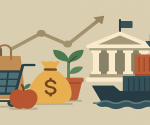The business models of wholesaling and retailing make up the commercial world. Two closely related but different kinds of businesses are wholesale and retail business, as there is a relation between a wholesale business and a retail business but perform a different function in a supply chain: wholesalers being an intermediary-the business first buys products in bulk from the manufacturers then distributes the same to retailers. They sell the same to consumers in smaller portions, with whom they are directly related. Understanding the difference between wholesale and retail is vital for any trade trader. The operational requirements and marketing strategies of both models are very different.
What is the Difference Between Wholesale and Retail
Wholesaling and retailing are differentiated by several key factors including customer type, transaction size, pricing, profit margin, and marketing needs. Below is an in-depth comparison between the two business models, each serving its specific function in the distribution chain.
1. Target Audience
Wholesalers sell mainly to retailers, firms, or other resellers who will then sell to the consumer. They never come in contact with consumers. Retailers, on the other hand, sell directly to the final customers, which are the individual customers who are going to use the product. That is, retailers are more concerned about customer experience and satisfaction than wholesalers are.
2. Transaction Size
Wholesaling transactions will consist of selling the goods in bulk, meaning large amounts of the same product sold in one go. Both parties—the wholesaler and the buyer—will incur decreased costs so that per-unit pricing becomes low. Retail transactions will be a small-scale scale that focuses on selling individual units or small quantities of goods as they appeal to consumer convenience and variety.
3. Pricing
The wholesale price is always less than the retail price. The high volumes bought entail little overheads. Wholesalers sell at such discounts to retailers who mark at retail to recover operating expenses involving the sale to the consumer at the retail level which is in the form of rents, marketing, and servicing customers.
4. Profit Margins
Whereas wholesalers apply a low per-unit profit margin, they compensate with a huge volume of sales. On the other hand, retailers apply a higher markup on every product, meaning that they have a larger profit margin per unit, although selling fewer units than the wholesalers.
5. Marketing Focus
Wholesalers are going to market the least, as the wholesaler bases more of their business on the relationship they build with their retail customers. Retailers need a full-scale marketing campaign to draw in customers and get out the message for each specific product and may need advertising, in-store promotions, loyalty programs, and other forms of customer engagement techniques to create brand loyalty and return business.
| Feature | Wholesale | Retail |
|---|---|---|
| Meaning | Selling goods in bulk to businesses | Selling goods in small units to customers |
| Buyer | Retailers, shopkeepers, or businesses | Final consumers or end users |
| Quantity Sold | Large quantities | Small quantities |
| Price per Unit | Lower price per unit | Higher price per unit |
| Profit Margin | Low margin, high volume | High margin, low volume |
| Type of Customer | Not for personal use | For personal use |
| Need for Showroom | Not always needed | Usually needs a shop or display |
| Capital Requirement | High investment | Moderate to low investment |
| Marketing Focus | Focus on bulk selling | Focus on attracting individual buyers |
| After-Sale Service | Rarely provided | Often provided |
What is Wholesale?
Wholesale refers to the practice of buying large quantities of goods directly from manufacturers and selling them to businesses or retailers at a lower per-unit price. Wholesalers serve as middlemen, linking producers with retailers, thus helping manufacturers distribute their products without the need for direct consumer sales. They purchase goods at a significant discount due to the high quantity and then distribute them to various retailers.
Characteristics of Wholesale
Wholesalers operate with a low profit margin but compensate by focusing on high-volume sales. They deal with fewer but larger transactions, which reduces the logistical costs and complexities associated with customer-facing sales. Since wholesalers do not interact directly with the final consumer, their focus is more on storage, inventory management, and maintaining strong relationships with retail clients.
Key Roles of Wholesalers
- Storage: Wholesalers often maintain large warehouses to store products until retailers need them, providing a buffer in the supply chain.
- Distribution: By handling the logistics of large-scale transportation, wholesalers relieve manufacturers of the responsibility of delivering products to various retailers.
- Financing for Manufacturers: Wholesalers frequently pay manufacturers upfront, thus providing immediate funds for the manufacturer to continue production.
- Price Stabilization: Through bulk purchases, wholesalers help stabilize prices across the supply chain, buffering price fluctuations that may occur due to seasonal demand or supply chain disruptions.
Pros of Wholesale
- Lower Operational Costs: Since wholesalers often sell in bulk without the need for significant advertising, their operational costs are reduced.
- High Volume Sales: Wholesalers deal in large quantities, which leads to high volume sales, providing a steady flow of revenue.
- Fewer Interactions with End Consumers: By selling directly to retailers, wholesalers avoid the need to handle individual customer inquiries or returns.
Cons of Wholesale
- Limited Brand Control: Wholesalers have limited influence over how their products are marketed to the end consumer, potentially affecting brand perception.
- Lower Profit Margins: Due to the bulk nature of transactions, profit margins per unit are often lower.
- Dependent on Retail Demand: Wholesalers’ success is contingent on retail demand. If retailers don’t sell enough, it can impact wholesale orders.
What is Retail?
Retailing is the selling of goods directly to the consumers. It purchases merchandise from wholesaler or producer and directly sells the commodities one piece at a time or some few pieces at a single time to the final buyers. Hence, such trade requires customer experience attention such that it asks retailers to focus on delivering satisfying shopping experiences, product quality, as well as customer services.
Characteristics of Retail
The individual sales model gives the retailer a more significant markup per unit. On top of that, they require storefronts, digital or physical, along with marketing and customer support infrastructure and resourceful systems for managing their inventory to meet customers’ expectations and compete better than their competition.
Key Roles of Retailers
- Providing Variety and Convenience: Retailers curate a selection of goods suited to their target demographic, offering convenience to consumers who prefer buying specific products in smaller quantities.
- Customer Service: Retailers engage directly with consumers, addressing inquiries, handling returns, and creating a pleasant shopping experience.
- Brand Experience: Retailers play a key role in building brand loyalty through marketing, in-store experience, and promotions.
- Local Market Knowledge: Retailers have a closer understanding of consumer preferences in their area, which enables them to stock products that meet the unique needs of their customers.
Pros of Retail
- Higher Profit Margins: Retailers mark up prices significantly, allowing for higher per-unit profits.
- Direct Consumer Interaction: Retailers can build relationships and loyalty with customers through personalized experiences.
- Greater Brand Control: Retailers have direct control over how products are displayed, marketed, and sold.
Cons of Retail
- Higher Operational Costs: Retail businesses require extensive investment in marketing, physical stores, and customer service.
- Inventory Risks: Since retailers purchase in smaller quantities, unsold inventory can lead to higher losses.
- Intense Competition: Retailers often face stiff competition and must differentiate themselves through customer service, unique products, or pricing strategies.
Types of Wholesalers
Wholesalers can be categorized into different types based on their role in the supply chain and the nature of their services:
- Merchant Wholesalers: These wholesalers purchase goods from manufacturers, take ownership, and sell to retailers. They manage inventory, storage, and distribution.
- Agents and Brokers: Acting as intermediaries, agents, and brokers connect buyers and sellers without taking ownership of goods. They earn a commission based on sales.
- Manufacturers’ Sales Branches: These wholesalers are directly affiliated with manufacturing companies and handle the distribution to retailers.
- Specialized Wholesalers: Focusing on specific industries like electronics, clothing, or health products, specialized wholesalers cater to niche markets, offering expert knowledge and product support.
Each type of wholesaler has unique roles and functions within the supply chain, helping meet the diverse needs of retailers.
Types of Retailers
Retailers can be categorized by their business models and the products they offer:
- Department Stores: These large stores provide a wide range of products organized by departments, appealing to customers looking for one-stop shopping.
- Supermarkets: Focusing on food and household products, supermarkets serve everyday consumer needs and emphasize convenience.
- Specialty Stores: Concentrating on a specific product category, such as electronics or apparel, specialty stores offer expert knowledge and dedicated service.
- E-commerce Retailers: Online platforms allow customers to shop from anywhere, offering convenience and competitive pricing.
- Discount Stores: These retailers sell items at reduced prices, often targeting cost-conscious customers.
- Warehouse Retailers: Known for bulk sales at discounted rates, warehouse retailers like Costco cater to customers seeking value for large purchases.
Can You Do Both Wholesale and Retail?
Yes, but some businesses have a wholesale and retail operations together. The dual model allows them to sell directly to consumers and also supply other retailers. A clothing brand will sell through its website and local stores but will also distribute products to other retail chains.
Benefits of a Hybrid Model
Operating through wholesale and retail channels expands the business to more markets, develops several revenue streams, and permits greater flexibility in handling overstock. Products unsold at retail can be shifted to a wholesale, thereby minimizing loss.
However, there are difficulties that are characteristic of a hybrid approach, too. This demands several types of experience about playing around with pricing strategies both at wholesale and retail and aligning the brand to maintain differentiation between different types of customers and relationships.
Difference Between Wholesale and Retail FAQs
1. What is the main difference between wholesale and retail?
Wholesale means selling goods in large quantities to businesses. Retail means selling goods in small quantities directly to customers.
2. Who buys from wholesalers?
Retailers, shopkeepers, and sometimes large businesses buy from wholesalers to resell the goods to final customers.
3. Who are retail customers?
Retail customers are the final users of the product. They buy goods for personal use, not for selling again.
4. Is the price lower in wholesale or retail?
Prices are usually lower in wholesale because goods are sold in bulk. In retail, the price is higher because sellers add profit and other costs.
5. Can a person buy from both wholesalers and retailers?
Yes. Businesses usually buy from wholesalers, while normal people buy from retailers. But some wholesalers also sell to individuals in bulk.


